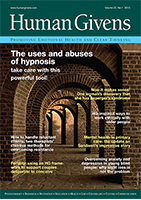Helping couples cope with their struggle for a child
Emma Charlton describes how the human givens approach provides the framework for the fertility support group she co-facilitates in Bristol.
When I was pregnant with a much-wanted first child, I imagined everyone close to me would naturally share my joy. So it was upsetting and puzzling when someone I considered a good friend seemed irritated whenever I talked about my feelings and hopes and started to withdraw from me. It wasn’t until some time later that I learned why. That friend had been desperately trying for a baby herself, and it hadn’t happened for her and her partner. Anything that brought her attention back to her pain, particularly the sight of contented pregnant women, felt like a dagger to her heart.
Later I saw how infertility and treatment for infertility deeply affected another friend and a colleague, changing their relationships with people they liked and loved, and leaving them in a very lonely place. I noticed their strikingly different coping strategies and also the effects of different outcomes: one stopped trying for a child and became more spiritual in her outlook on the world; the other had successful in-vitro fertilisation (IVF) treatment and is mother to a gorgeous little girl, yet struggles with the guilt she feels about all the negative, even spiteful, emotions she felt during her treatment years towards loved ones who had children.
So when, as a qualified therapist, I decided I would like to develop a specialist area, working with infertile couples seemed a valuable specialty to pursue. I had completed a course called The Fertile Body Method, devised by Sjanie Hugo Werlitzer, which is based on human givens understandings of emotional needs and effective use of innate resources. I also attended Sjanie’s webinar, run in conjunction with Infertility Network UK, which gave practical guidance on setting up a support group. Having been active as a volunteer for a mental health charity group, I liked the idea of helping people meet their need to connect, in a group setting where they could feel safe and start to meet other needs, too. This is something massive that is missing in very many infertile couples’ lives because, while pursuing fertility treatment, so many emotional needs cease to be met.
The many needs not met
One of the biggest changes, particularly for women undergoing fertility treatment, is that their world shrinks. Not only does it start to focus around clinic appointments and procedures and outcomes but very many find it too painful, as did my friend, to be around, or even see, pregnant women or women with young children. Many are overwhelmed by their feelings of frustration and the strength of the envy, jealousy and even anger they feel towards friends and family. Because they also can’t bear repeatedly being asked, “So when are you going to start a family?”, they start to disconnect themselves from their social communities. They also want to protect themselves from heedless comments that people may make, imagining them to be helpful: “Just stop stressing – if you relax, it will all be okay”; “Don’t worry – I got pregnant really quickly with my first child but it took a lot longer with my second”.
Sense of status changes, as young couples see their contemporaries making the transition to parenthood, and they feel left behind. Whereas new mothers sometimes struggle with the loss of their status as independent, competent working professionals, for those dealing with fertility problems the elusive status of mother is the only one that now matters. Other achievements cease to mean much. And privacy feels horribly invaded. Not only do couples have to submit themselves to questioning by clinicians about their sex lives and have their emotions reduced to biological information, but they may also have to field endless questions from their own families. Here it is a case of receiving too much well-meaning attention. Even if a mother or mother-in-law, sister or sister-in-law doesn’t actually ask what is happening, a couple fears that this is what they are wondering, and this sense of invasion of privacy may lead them to cut themselves off from what could be a source of support. Many women are reluctant to tell colleagues at work what they are going through and even refrain, to safeguard their privacy, from seeking permission for time off for medical procedures – in the process, using up precious holiday entitlement which might be put to better use.
Sense of control and autonomy diminish alarmingly. Most medical treatment focuses on the woman, whether the difficulties with fertility emanate from her or her partner, and she is obliged to comply with stringent procedural requirements. While lesbian couples experience all the aforementioned difficulties, too, heterosexual couples may also feel increasingly out of control of their physical feelings, as sex becomes ‘timed’ and there is pressure to perform. Spontaneity disappears and, at this time, emotional connection between a couple can become dangerously fragile, particularly if a woman needs more emotional support than a partner with a practical or problem-solving bent can actually give.
Loss of sense of meaning to life is, perhaps, the biggest loss of all. Being infertile can bring tunnel vision, and couples very often feel that they have no meaningful purpose in life, if they cannot fulfil the cultural expectation of having children. We tend to expect to be able to have children, if we want them. We even use the word ‘expecting’ when a baby is on the way – it is an accepted life stage. When that expectation is thwarted, a major re-evaluation of what constitutes meaning has to take place. Changed expectations of how life will turn out impact strongly on sense of security. One’s world is no longer a safe place.
Learning curve
My plan in the new group was to explain and explore emotional needs, what happens when they are not sufficiently well met and how better to meet them. Having attracted interest through Facebook and my web page, I plunged in, arranging a venue where the group could meet once a month for about an hour and a half. Although we meet at the premises of the Natural Pregnancy Partnership in Bristol, we are mindful of the extreme sensitivities of our members and so ensure that no events connected with pregnancy are held on our evening.

Running the group has been a steep learning curve for me. I realised very quickly that couples undergoing infertility treatment are highly knowledgeable about the variety of medical procedures involved, down to the different costs of different drugs, and that, even though I saw my role as providing people with knowledge and skills to better meet their emotional needs, it would be easy to lose rapport if I couldn’t match their technical knowledge. This is exactly what happened at the very first meeting when, fortunately, just one couple had turned up. When I was asked a technical question that I couldn’t answer and I mentioned that I was still learning about all that was involved, the husband gave me an encouraging smile but I saw his wife metaphorically take a step back. They didn’t come to any more meetings. Now, I make a point of knowing as much as I can about the infertility treatment experience. I have visited, and been welcomed at, infertility clinics to learn how they are run and exactly what is involved, and I go to listen to talks about infertility treatments that couples attend – which enables me both to update my knowledge and to get a sense of couples major concerns. Most importantly, I now work with a fellow therapist who had years of infertility treatment herself. Although we know as human givens therapists that what is important is entering another’s reality, not sharing it, I have found that, in the setting of a support group, having a facilitator with first-hand knowledge of members’ experience is essential for genuine rap-port. Indeed, when people have been on the end of so many unintentionally hurtful comments, “You have no idea what it is like for me!” is a cry deep from the heart that it is crucial to be able to counter.
Psycho-education
That said, at meetings we try to keep people away from too much discussion of medical matters and cost comparisons. We aim to keep meetings light, as a break from all that pressure. I explain that our aim is to help people lower their stress and find ways to meet emotional needs. Psycho-education in itself is helpful. For instance, I can explain that stress disrupts the endocrine system and affects behaviour and thinking. Knowing that “this isn’t really me” helps women a lot. I teach everyone 7:11 breathing, through which they can take back a welcome degree of control – particularly in cases where the hormones women have to take are affecting their moods at work and their sense of competence. They know that they have a simple, discreet way of calming themselves down.
I try to normalise women’s intense negative feelings towards pregnant women, perhaps using a post-hypnotic suggestion, such as “This is a natural feeling and, as time goes on, you can find that you start to experience it less and less”. I have to slip in such suggestions discreetly, however, and had to rethink my idea of using guided imagery to leave everyone feeling calm and positive at the end of meetings. Many in the group (we tend to have up to eight people attending on any one night, usually all couples) are somewhat sceptical of and resistant to what they think of as airy-fairy stuff. They have been through so many holistic therapies and not attained the yearned-for pregnancy. Men, particularly, express wry comments about mindfulness sessions they have attended, where they were asked to concentrate on a raisin. For them, group relaxation and guided imagery is all part and parcel of some holistic hocus-pocus, so, again in the interests of maintaining rapport (negativity can infect others), I restrict use of guided imagery to my one-to-one sessions, which some individuals from the group may choose to attend.
Better meeting of needs
Group members find it helpful to take away emotional needs audits and, in the session, we will focus on ways to better meet needs. For instance, people may put themselves under pressure to keep fit, eat sensibly, and not get too stressed, because they see this as part of the package of desperately trying to get pregnant. Or else they view such efforts negatively, convinced that they won’t help them achieve their goal. We re-frame efforts to keep fit, eat well and relax as another valuable way to take back control over their lives. We emphasise the need to do what makes them feel good. Exploring natural fertility methods, which involve identifying ovulation time on the basis of vaginal secretions, can also be a means of taking back control. Many people think that ovulation happens on day 14 of the menstrual cycle, when usually it doesn’t. Ovulation times vary from woman to woman and having a means by which to identify one’s own not only increases sense of control but, in the process, helps reduce stress.
To help people regain their sense of status and achievement, we have discussions that remind them of who they are in the non-fertility aspects of their lives and help them to remember and reconnect with their achievements and positive qualities. Because couple relationships often buckle under the emotional and physical demands of fertility treatments, we put a lot of emphasis on people reconnecting with each other. They get so focused on procedures that they can forget why they are even together. So we go around the group, getting people to recall and share things they used to enjoy doing together or always wanted to do, thus rehearsing pleasurable activities in their imaginations, and then ask them to put the plans into action. It might mean something as simple as taking time for a country walk together. One couple, however, chose to take up kayaking again. Another couple made a point of going away for a short holiday between treatments. A few couples, as a result of discussions like this, decided to take a break from IVF and focus on each other, in one case taking an extended trip.
We discuss ways to find new meanings in life, perhaps by giving back to others, opening up to a new philosophy of life or taking up something new and absorbing. If such meaning is in place, it is generally easier for people to orient themselves to a life without their own children, if the time comes when they decide to stop trying.

Our own group, of course, serves to help meet people’s needs for community. It originally surprised me that most people come to the group as couples, and it is certainly wonderful having partners involved. On the downside, however, women whose partners choose not to attend tend not to stick with the group because they feel out of place. This is unfortunate, as they might perhaps be in the greater need of support. I am trying to accommodate this in an online support group that I have established for people to join as individuals. There is also a need to be met for women with secondary infertility, who may be devastated to find that they cannot get pregnant again after successfully having a child (especially if now with a new partner). Yet their presence would cause much discomfort at our monthly group, where the pain of not being able to conceive at all or bring a pregnancy to term is so raw. I am trying to put women with secondary infertility in touch with each other, through a ‘Secret Facebook Group’, with the hope that it may develop into a meeting place for talk and support.
On one occasion I was contacted by a woman in her late 50s, who wanted to join our monthly group. She had been unable to have children and felt she had dealt with that long ago and moved on in her life. Then suddenly she was pole-axed by resurgence of all the old pain, when her friends started to become grandparents. I referred her on for private therapy but there may well be a value in community support in such circumstances, too.
We make as much use as possible in the group of innate resources. One that we remind people of is – resourcefulness! Many people become incredibly resourceful in their efforts to raise money for IVF treatment, for instance through car boot sales or becoming ‘Avon ladies’. We remind them, if they reach the point of deciding not to continue with treatment, that they can redirect that determination and inventiveness towards achieving other goals. We always recommend goal setting within the group, but it must be handled very sensitively, as many couples may initially be able to concentrate on no other goal than having a baby. We urge small, achievable goals, such as creating the best possible physical and mental conditions for undergoing the treatment. Similarly, we don’t rehearse in imagination outcomes that may not be achievable but focus instead on using the imagination to reinforce staying calm, having fun, living life. We also show people how to use their rational minds to give themselves privacy from their tortured thinking – cognitive and mindful ideas for letting go of negative thoughts help enormously here.
Optimism
Our group has been going for 18 months now and it is clearly meeting a need, as it draws in people from quite a distance. One comment left on our website perhaps sums up what we hoped to achieve: “This support group left me with a feeling of optimism, a welcome reprieve from the hopelessness. The opportunity to talk about these feelings in a safe, supportive, friendly and welcoming environment was such a gift. The practical aspects were really interesting, too, such as techniques to deal with stress and anxiety that I can use in my day-to-day life.”
Of course, when and whether to stop infertility treatment is an issue that, inevitably, comes up, with discussion centring around the financial, physical and emotional toll of continuing treatment. I have noticed distinct gender differences here. Men take a problem-solving approach and are more interested in setting a limit. They find it easier to draw a line, whereas women are more likely to want to explore every possible avenue, regardless of financial and emotional cost. If the decision to stop is taken, it is at that point that couples choose to leave the group. And, at that point, some individual sessions, usually with the woman, can be highly beneficial, so that we can focus on putting the trauma of the infertility treatment journey behind her, build up personal resources, embed coping strategies and rehearse a different but equally meaningful future, reinforced in guided imagery.
 EMMA CHARLTON is a trained solution-focused hypnotherapist who holds the Human Givens Diploma. She practises in Bristol and Somerset. For more information about the fertility support group she runs, please visit www.emmacharltonhypnotherapy.co.uk/ or contact her directly at [email protected]
EMMA CHARLTON is a trained solution-focused hypnotherapist who holds the Human Givens Diploma. She practises in Bristol and Somerset. For more information about the fertility support group she runs, please visit www.emmacharltonhypnotherapy.co.uk/ or contact her directly at [email protected]
This article first appeared in "Human Givens Journal" Volume 22 - No. 1: 2015
 Spread the word – each issue of the Journal is jam-packed with thought-provoking articles, interviews, case histories, news, research findings, book reviews and more. The journal takes no advertising at all, in order to maintain its editorial independence.
Spread the word – each issue of the Journal is jam-packed with thought-provoking articles, interviews, case histories, news, research findings, book reviews and more. The journal takes no advertising at all, in order to maintain its editorial independence.
To survive, however, it needs new readers and subscribers – if you find the articles, case histories and interviews on this website helpful, and would like to support the human givens approach – please take out a subscription or buy a back issue today.
Latest Tweets:
Tweets by humangivensLatest News:
HG practitioner participates in global congress
HG practitioner Felicity Jaffrey, who lives and works in Egypt, received the extraordinary honour of being invited to speak at Egypt’s hugely prestigious Global Congress on Population, Health and Human Development (PHDC24) in Cairo in October.
SCoPEd - latest update
The six SCoPEd partners have published their latest update on the important work currently underway with regards to the SCoPEd framework implementation, governance and impact assessment.
Date posted: 14/02/2024














